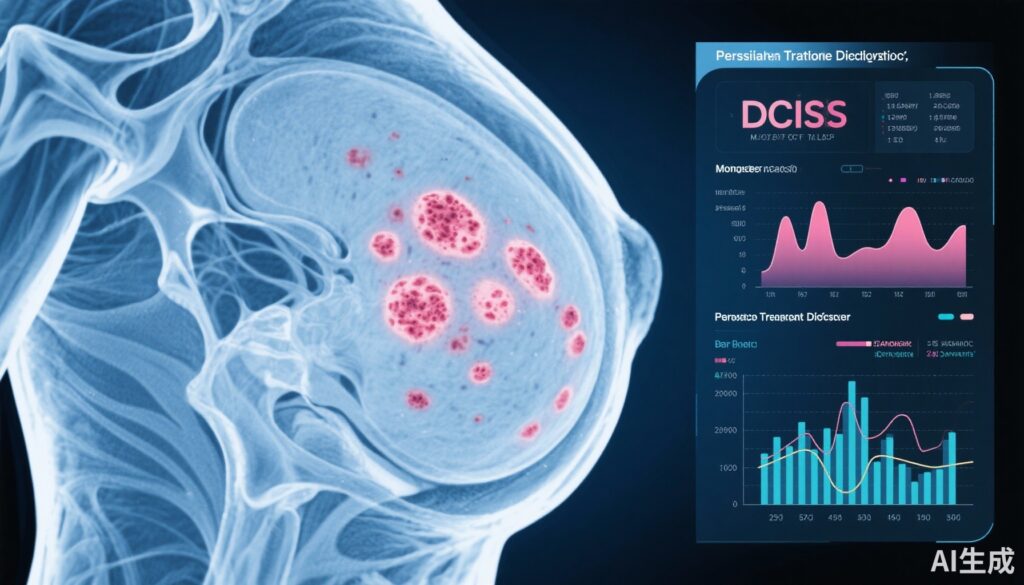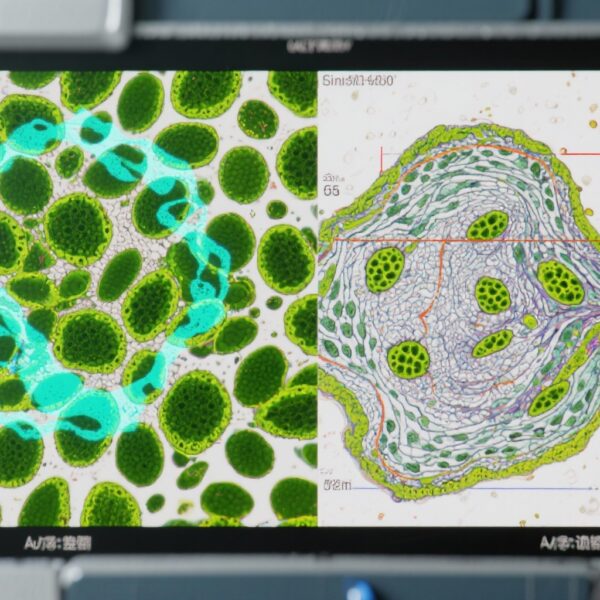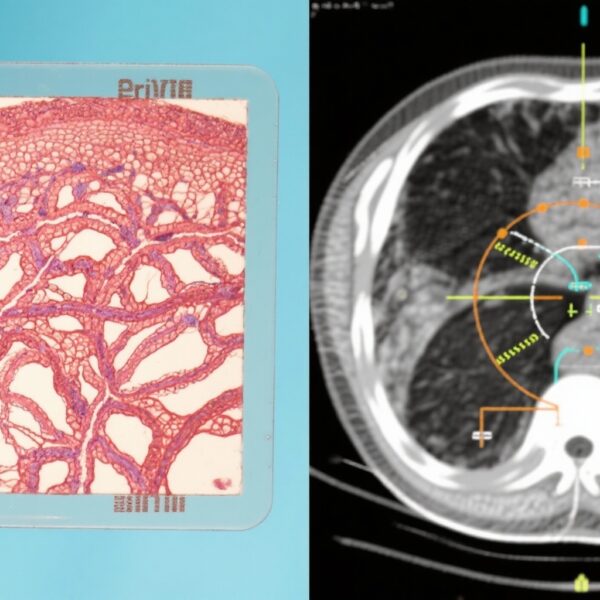Highlight
- This multicenter prospective trial evaluates the use of a 12-gene expression assay (DCIS score) to guide postoperative radiotherapy after breast-conserving surgery in patients with ductal carcinoma in situ (DCIS).
- Among 171 women with successful wide local excision and DCIS score data, adherence to gene assay recommendations correlated with low 5-year ipsilateral breast event (IBE) rates approximately 5%, irrespective of gene risk category.
- Findings support the selective omission of radiotherapy for low DCIS score patients and the use of radiotherapy for intermediate/high scores, potentially personalizing DCIS management and reducing overtreatment.
- Confirmatory larger trials are required to validate these promising results and integrate molecular assays into DCIS clinical decision pathways.
Study Background
Ductal carcinoma in situ (DCIS) is a non-invasive form of breast cancer characterized by malignant cells confined within the milk ducts. Its natural history is heterogeneous, ranging from indolent lesions unlikely to progress to invasive cancer, to aggressive subtypes with high recurrence risk. Standard treatment for screen-detected DCIS often involves breast-conserving surgery (wide local excision, WLE), typically followed by radiotherapy to reduce recurrence risk. However, routine application of radiotherapy may lead to overtreatment in patients with low-risk disease, exposing them to unnecessary side effects without clear benefit.
Personalized treatment strategies are therefore essential to balance recurrence prevention with treatment morbidity. A 12-gene expression assay, termed the DCIS score (DS), has emerged as a promising molecular tool to stratify DCIS risk and guide radiotherapy decisions. This study presents the first prospective oncologic outcomes evaluating DS-guided postoperative radiotherapy recommendations.
Study Design
This single-arm, multicenter, prospective trial enrolled 339 women with screen-detected DCIS eligible for WLE from March 2015 to April 2016 across 75 institutions within the Eastern Cooperative Oncology Group-American College of Radiology Imaging Network. Preoperative breast magnetic resonance imaging (MRI) was performed to guide surgical planning.
Participants underwent WLE, and those with negative surgical margins and successful DCIS score assay results (n=171) formed the cohort for prespecified analysis. Postoperatively, radiotherapy recommendations were guided by the DCIS score: omission of radiotherapy for low DS (<39) and administration of radiotherapy for intermediate/high DS (≥39).
Participants were followed every six months for up to five years to monitor for ipsilateral breast events (IBE), including both DCIS recurrence and invasive breast cancer within the same breast. The primary endpoint was the 5-year IBE rate.
Key Findings
The mean age of the study cohort was 59.1 years. Among 171 women with negative margins and DCIS score results, adherence to the assay-guided radiotherapy recommendations was high (93.0%). Specifically, 8.5% of patients with low DS received radiotherapy against recommendation, and 5.6% with intermediate/high DS declined radiotherapy.
After a median follow-up of 5 years, 8 participants experienced ipsilateral breast events, yielding an overall 5-year IBE rate of 4.8% (95% CI, 2.4%-9.4%). The 5-year IBE rate for the low DS group was 5.1% (95% CI, 1.9%-12.9%) and for intermediate/high DS group 4.5% (95% CI, 1.7%-11.7%), showing comparable outcomes.
Among those adhering strictly to radiotherapy recommendations, the IBE rate was 5.5% for low DS patients and 4.8% for intermediate/high DS patients, reinforcing that gene assay-based guidance may safely direct radiotherapy use.
These 5-year IBE rates, particularly the approximately 5% recurrence risk in intermediate/high DCIS score patients receiving radiotherapy, are notably lower compared to historical data from WLE alone, suggesting that molecular assay-guided radiotherapy improves risk stratification and treatment efficacy.
Expert Commentary
This trial notably advances personalized oncology by prospectively validating the clinical utility of a 12-gene expression assay to inform radiotherapy after breast-conserving surgery in DCIS. By integrating molecular profiling, clinicians can better identify patients who safely forgo radiotherapy and those who benefit most, balancing treatment efficacy with side effect burden.
However, the study is limited by its single-arm design and modest sample size, which restrict definitive conclusions. Also, long-term outcomes beyond 5 years will be essential to establish durability of benefit given DCIS’s protracted risk timeline. Future randomized studies comparing assay-guided management against standard treatment pathways will further elucidate clinical impact.
These findings align with recent guideline trends emphasizing biomarker-driven personalized approaches in early breast cancer and underscore the potential for gene expression assays to refine DCIS care further.
Conclusions
This study provides important prospective evidence supporting the incorporation of a 12-gene expression assay, the DCIS score, to guide postoperative radiotherapy after wide local excision in patients with ductal carcinoma in situ. The assay-guided approach achieved low ipsilateral breast event rates and high adherence, suggesting it may safely facilitate radiotherapy omission in low-risk cases and appropriate use where risk is elevated.
While promising, confirmatory large-scale randomized trials and longer follow-up are needed before widespread clinical adoption. Nonetheless, this molecular assay exemplifies the emerging paradigm of precision oncology, aiming to tailor DCIS treatment intensity according to individual tumor biology and reduce unnecessary interventions.
Funding and Clinical Trial Registration
This study was conducted under the auspices of the Eastern Cooperative Oncology Group-American College of Radiology Imaging Network and was registered at ClinicalTrials.gov (Identifier: NCT02352883).
References
Khan SA, Romanoff J, Gatsonis C, et al. Radiotherapy With a 12-Gene Expression Assay for Ductal Carcinoma In Situ: A Randomized Clinical Trial. JAMA Oncol. 2025 Oct 16:e254079. doi:10.1001/jamaoncol.2025.4079. Epub ahead of print. PMID: 41100122; PMCID: PMC12532027.
Early Breast Cancer Trialists’ Collaborative Group (EBCTCG). Effect of radiotherapy after breast-conserving surgery on 10-year recurrence and 15-year breast cancer death: meta-analysis of individual patient data for 10,801 women in 17 randomised trials. Lancet. 2011;378(9804):1707-1716.
Solin LJ, Gray R, Baehner FL, et al. A multigene expression assay to predict local recurrence risk for ductal carcinoma in situ of the breast. J Natl Cancer Inst. 2013;105(10):701-710.
Worni M, Akushevich I, Greenup R, et al. Comparing treatment strategies of ductal carcinoma in situ: a population-based cohort study. J Natl Cancer Inst. 2015;107(12):djv263.
Burstein HJ, Curigliano G, Loibl S, et al. Estimation of Benefits and Harms of Active Surveillance for Ductal Carcinoma In Situ: A Decision Analysis. JAMA Oncol. 2016;2(8):977–984.



